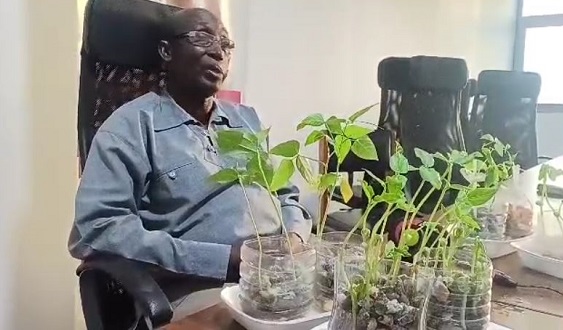President of Dominion University College, Professor Nicholas N N Nsowah-Nuamah, is calling on the government and stakeholders to explore Geological Agriculture as an innovative solution to Ghana’s twin challenges of illegal mining (galamsey) and youth unemployment.
Speaking during a global virtual conference on Geological Agriculture hosted by Dominion University College on Tuesday, April 22, 2025, Prof. Nsowah-Nuamah highlighted the transformative potential of this emerging practice.
Geological Agriculture involves growing crops directly in crushed rocks and mineral-rich geological materials—completely eliminating the need for traditional soil or synthetic fertilizers.
"The reason I see this as a game-changer is because of the pressing issues we face—galamsey and youth unemployment,” Prof. Nsowah-Nuamah said. “Yes, it’s commendable that government is training 100 coders, but this is another equally important path. It not only offers employment but also yields tangible results while training is still ongoing.”
Impact
According to him, the model offers immediate impact: “As individuals learn, they also produce. By the time the training ends, there is output—crops bearing fruit. That’s why I believe the government should invest in training young people to grow food using rocks.”
He emphasized that Geological Agriculture is low-cost and accessible, requiring minimal resources to start. “You don’t need land, you don’t need capital—only training. Rocks are everywhere. Just collect some, place them in recycled plastic containers, and apply the training to grow vegetables. It’s what I call ‘Operation Feed Your Family’—and it can be done both indoors and outdoors.”
Prof. Nsowah-Nuamah also stressed the environmental importance of this method, especially given the damage inflicted on Ghana’s farmlands by overuse and galamsey activities.
“Our soil has been degraded over time through excessive farming, fertilizer use, and illegal mining,” he noted. “Much of the land is now contaminated and unfit for cultivation. Geological Agriculture gives us a chance to rest the land while still growing food safely and sustainably.”
He urged the government and private sector to view this as a viable alternative that can both restore environmental balance and create employment opportunities.
Event
The conference brought together scientists, policymakers, researchers, and agricultural innovators from across the globe to explore how rock-based farming techniques can transform modern agriculture.
It served as a platform for global collaboration, enabling participants to engage directly with leading experts in agriculture, geology, and environmental science.
A key focus of the event was to foster strategic partnerships and encourage the widespread adoption of geological agriculture as a sustainable solution for food security amid growing climate and environmental challenges.
Highlights included expert panel discussions and interactive breakout sessions on topics such as soil regeneration, sustainable indoor and outdoor cultivation, and the integration of technology to boost agricultural productivity.
Embracing innovation
In his welcome address at the Geological Agriculture Conference, Executive Chairman of Dominion University College, Professor Felix Nikoi Hammond, emphasized the institution's commitment to innovation and global relevance through the exploration of emerging technologies.
“At Dominion University, we are constantly seeking out new technologies and ideas from around the world,” he stated. “One of our core pillars is experience—we believe in practical, hands-on learning that exposes students to real-world innovations.”
He added that the university is equally grounded in authority, striving not just to participate in new fields but to lead in them. “Whatever we engage in, we aim to lead—not just scratch the surface. This conference presents a significant opportunity for us to advance our vision and collaborate with partners to help Africa embrace and implement this new agricultural technology.”
Alternatives to traditional farming
Prof. Hammond criticized the long-standing conventional approaches to agriculture, describing them as increasingly unsustainable in the face of environmental and socio-economic challenges.
“Soil degradation is occurring at alarming rates across the continent,” he noted. “The continued use of chemical fertilizers and outdated methods like bush burning and fallowing are not only ineffective but harmful in the long term.”
He also highlighted one of the key barriers to agricultural progress in Ghana and much of Africa—the issue of land tenure. “Access to land is a major constraint due to widespread litigation and ownership disputes, leaving many farmers unable to cultivate.”
Prof. Hammond concluded by urging a shift in mindset: “We must move beyond traditional thinking and seriously consider alternatives like Geological Agriculture. The time has come to adopt sustainable, accessible, and innovative solutions to feed our people and protect our environment.”
Related Article: Geo Agriculture: A sure way to lessen impact of climate change

